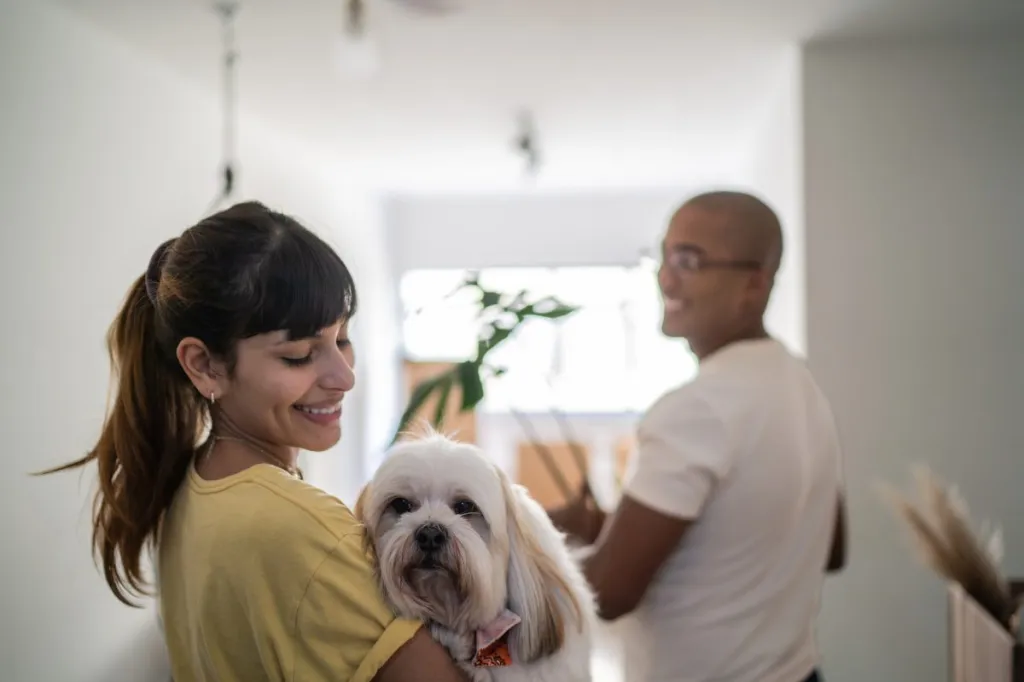Congratulations! You’re bringing a new dog home. Now what? You must be excited and looking forward to creating a lifelong friendship with your new canine pal. But how does your new furry family member feel? Imagine the bewilderment they must be experiencing. Whether you purchased a puppy from a breeder or adopted an adult dog from a shelter or rescue, going home is a new experience. Your new dog is likely to be a little disoriented.
It’s important to help your new pet acclimate to your home by being prepared and patient. It may take anywhere from a few days to two months for you and your new dog to adjust to each other.
Consider the following tips to make the transition a smooth one:
Have supplies ready before bringing a new dog home
Get the things your dog will need ahead of time. Make sure you have all the necessary supplies before you bring your new pup home.
Quality time
Bring your new dog home when you can put aside a lot of time to get acquainted. Time your pup’s arrival for a weekend or when you can take a couple of days to be home. Spend some quality time together and really get to know each other to make your new dog feel secure and at ease, and connected with you.
Health check-up
Schedule a veterinarian appointment within a week after you bring your new dog home. Fido will receive a health check and any vaccinations she might need. Talk to your vet or read more about the benefits of spaying and neutering! With far too many homeless dogs and puppies, don’t let your new dog add to the problem of pet overpopulation.
Establish rules and responsibilities
Who will take responsibility for the dog’s daily care? Work out your dog-care schedule ahead of time with the members of your household. Dogs need a routine and they need to know the rules of the house. Whatever routine you establish, stick to it and your new dog will quickly adapt.
Training and discipline
Dogs are pack animals so they need order. You need to make yourself the “pack leader” and let your dog know who’s boss from the beginning. If you catch your pup doing something they shouldn’t, just stay calm and let them know right away, in a loud and disapproving voice, that they behaved badly.
Always reinforce the positive and reward your dog with praise when she does well. Your dog will learn more through positive reinforcement. Make sure you sign up for a dog obedience class or hire a trainer to help you. A well-trained dog will make all the difference in your relationship with your canine pal.
Housetraining
The key to housetraining your dog is to be consistent and maintain a routine. Even if it requires coming home at lunch or straight home from work every day, the extra effort will pay off with faster potty training.
Crating
Dogs like to create a den for themselves. It’s a natural instinct. So while a crate may look harsh to you, for your dog it’s a room of their own. A crate can make housebreaking and obedience training a whole lot easier.
You don’t want to crate your dog all day or all night, or they will consider it punishment. Just a few hours a day should be more than enough. Make sure you buy a crate that doesn’t have wire where your pup’s collar or paws can get caught. The crate should always be roomy enough to allow your dog to stand up, turn around, and be comfortable in.
An alternative to crating is to find a dog-proofed area of your home for temporary confinement. A baby gate can work very well to portion off a part of the family room or kitchen. Crated or confined to a separate area, your dog will feel a lot more comfortable (and will whine less) if they can see or hear the other family members and know that their new pack is nearby.
Time to play
A well-exercised dog is a happy dog. A happy dog is more well-behaved, and that will make you happy as well! Dogs need an active life to be content and well-adjusted. Schedule physical activity with your dog every day. Depending on your dog’s energy level and need for stimulation, that could mean several playtime sessions a day.
Go for a long walk or jog together, try throwing the ball or a stick for a game of fetch, or take a drive to your local dog park. Most dogs really thrive on playing with other dogs so socialize your new dog with other canines so they learn good social skills early on. Consider taking your new dog along when you hit the road for a drive in the country or to visit friends and family. They love new adventures!
Friends for a lifetime
Life with you is a different experience for your new dog, so give them time to adjust and manage your own expectations. Soon enough you’ll find out that you’ve made a new friend for life. No one will ever greet you with as much excitement, or give you the unconditional love and loyalty your new companion will.









